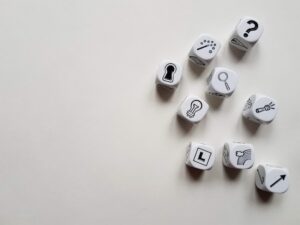Future Applications for Data Storytelling Toolkits
Kate McDowell, Rhiannon Bettivia, Maria Bonn, Jennifer Campbell-Meier, Jessica Yi-Yun Cheng, Isabella Lena Corieri, Ly Dinh, Sam Ehlinger, Heidi Enwald, MD Khalid Hossain, Norman Meuschke, Melissa Ocepek, Misita Anwar, Sarika Sharma
Stories are much easier to remember than spreadsheets. Although data alone cannot drive or decide, they can be powerful if communicated memorably, and human memory retains information in story form. When it comes to translating data as evidence into compelling and memorable arguments, many people need some guidance about how to approach crafting a story.
There is great potential for toolkits that would provide such guidance, giving advocates and data analysts tools for communicating data in story form. Data Storytelling is an emerging area in the information sciences, and the term as used here means any form of communication of data that uses narrative strategies or story structures.
—Stories are much easier to remember than spreadsheets—
A recent workshop explored the qualitative and narrative strategies needed to build effective data storytelling toolkits for information organizations, and the conversations uncovered many possible applications. The workshop goals were to explore data storytelling as a strategy for thinking about applications of data for justification/advocacy in information organizations, and to identify a range of possible applications for data storytelling toolkits.
The concept of building data storytelling toolkits is based on the Data Storytelling Toolkit for Librarians (DSTL) project, which is under development at the University of Illinois Urbana-Champaign (see https://uiucdstl.wixsite.com/uiucdstl). The toolkit guides users in aligning arguments, evidence, and narrative strategies as the basis of compelling data stories. This toolkit is being built to help librarians develop data stories to advocate for library funding and other resources, from budgets for staff to building improvements. But the applications for storytelling go beyond advocating to fund libraries.
 Before describing potential applications, it is important to understand a bit about the structure of a data storytelling toolkit. The DSTL has so far involved three years of qualitative research into how librarians and related information professions use data storytelling. The DSTL research team has developed two kinds of basic structures for data storytelling toolkits: advocacy arguments with evidence, and narrative strategies. These structures are highly adaptable to other applications.
Before describing potential applications, it is important to understand a bit about the structure of a data storytelling toolkit. The DSTL has so far involved three years of qualitative research into how librarians and related information professions use data storytelling. The DSTL research team has developed two kinds of basic structures for data storytelling toolkits: advocacy arguments with evidence, and narrative strategies. These structures are highly adaptable to other applications.
1. Advocacy arguments with evidence
Underlying any successful data story is evidence framed within an argument. While the specific arguments and forms of supporting evidence would be different for various applications, the conceptual approach to structuring a set of arguments and typical forms of supporting evidence could be developed for numerous applications. The examples in this chart are based on the DSTL.
| Arguments | Evidence |
| Understand the needs of their communities | •community demographics •local user surveys •local non-user surveys •other agencies’ reports |
| Serve the needs of their communities | •community demographics •local user surveys •local non-user surveys •other agencies’ reports |
| Be equitable with other organizations | •comparative data |
| Build on existing strengths | •comparative data •local user surveys •other evidence of existing strengths |
| Address deficits | •comparative data •local user surveys •other evidence of existing deficits and how to address |
Different applications would involve developing different sets of typical arguments as the basis for data storytelling. Whether the data as evidence support these advocacy arguments is up to the toolkit user to determine, but this structure provides a guide for thinking about how data can inform data stories.
2. Narrative Strategies for Information Stories
Three classic narrative strategies that come from scholarship in narratology and semiotics provide a structure for organizing informational and emotional content together in story form. The three strategies are: continuity, transformation, and discovery
| Narrative Strategies | Emotional Impact | Originating Theory |
| Continuity | Stability and resilience despite challenges, reassurance of continuity | Tsvetan Todorov’s The Fantastic, and the story “The Stonecutter” by Andrew Lang, attributed as Japanese but actually Dutch in origin |
| Transformation | Awe at transformation, joy of watching a hero triumph | Joseph Campbell’s The Hero With a Thousand Faces |
| Discovery | Mystery, suspense, intrigue, and satisfaction of coming to understanding | Roland Barthes’ hermeneutic or enigma code, one of five semiotic codes in S/Z |
These narrative strategies apply to so many different potential data stories, and they may even be combined in certain contexts. For example, in arguing for a larger library building, an advocate might tell a data story about the current ratio of people to space—including seating or square footage—and describe the changes needed to transform the library so that its facilities maintain historical continuity with past ratios of people/space.
Workshop participants contributed ideas for an array of possible applications of the toolkit concept. These were the possible applications:
- Provenance of items, objects, artifacts
- Authentication and valuation of artworks in order to assure appropriate stewardship (preservation, insurance, etc.)
- Advocating for using ‘datasheets’ for datasets to enable reproducibility and access to researchers from different paradigms
- Data syndication: how information ends up in widgets like Google Knowledge Panels, how we understand, and how we trust this data
- Increasing understanding of food provenance through data about food as informated commodity
- Data in story form that can mediate between the needs of crisis responders for immediate usability and the need of researchers for methodological rigor
- Improving science/crisis communication to practitioners and the public; lessen the gap between researcher “language” and practitioner “language”.
- Unraveling the causes and impacts of research retraction and scientific misconduct
- Advocating for increase of available childcare resources in the US state of Vermont with evidence of need
- Advocating for investment of higher education resources strategically, with “good news” evidence of successes first followed by requests for new investments second
- Increasing awareness of stigma that affects people with disabilities in developing countries
- Documenting the impact of researchers or organizational units, e.g., as part of hiring and promotion procedures or funding negotiations
- Advocating for achieving sustainable development goals, with participation of communities lagging behind, in both developed and developing countries
It could require significant research to fully develop data storytelling toolkits for each of these applications, from understanding available data to identifying the most common or standard types of arguments that underlie these kinds of data stories. However, these basic conceptual tools—advocacy arguments with supporting evidence and classic narrative strategies—could be foundational to helping people make data have impact as meaningful and memorable storytelling.
Workshop Participants and Co-Authors:
These possible areas of application for the data storytelling toolkit ideas were generated entirely through the thoughtful contributions of co-authoring participants. Those participants were:
- Rhiannon Bettivia, Assistant Professor, Simmons University, USA
- Maria Bonn, Program Director and Associate Professor, University of Illinois at Urbana-Champaign, USA
- Jennifer Campbell-Meier, Senior Lecturer, Te Herenga Waka – Victoria University of Wellington, New Zealand
- Jessica Yi-Yun Cheng, Assistant Professor of Library and Information Science, Rutgers University, USA
- Isabella Lena Corieri, PhD Student, Syracuse University, USA
- Ly Dinh, Assistant Professor of Information Science, University of South Florida, USA
- Sam Ehlinger, MSLIS Student, University of Illinois at Urbana-Champaign, USA
- Heidi Enwald, Adjunct Professor and University Lecturer of Information Studies, University of Oulu, Finland
- MD Khalid Hossain, Research Fellow, Monash University, Australia
- Norman Meuschke, Senior Researcher for Information Retrieval, University of Göttingen, Germany
- Melissa Ocepek, Assistant Professor, University of Illinois at Urbana-Champaign, USA
- Misita Anwar, Lecturer, Swinburne University, Adjunct Research Fellow, Monash University, Australia
- Sarika Sharma, Postdoctoral Fellow, University of Texas at Austin, USA
References
Gebru, T., Morgenstern, J., Vecchione, B., Vaughan, J. W., Wallach, H., Iii, H. D., & Crawford, K. (2021). Datasheets for datasets. Communications of the ACM, 64(12), 86-92.
McDowell, K. (2021). Storytelling wisdom: Story, information, and DIKW. Journal of the Association for Information Science and Technology, 72(10 (Special Issue: Paradigm Shift in the Field of Information)), 1223–1233. https://doi.org/10.1002/asi.24466
McDowell, K. (2024). Storytelling and/as Misinformation: Storytelling dynamics and narrative structures for three cases of COVID-19 viral misinformation. Cambridge Studies on Governing Knowledge Commons. https://hdl.handle.net/2142/117174
Wahle, J. P., Ruas, T., Mohammad, S. M., Meuschke, N., & Gipp, B. (2023). AI Usage Cards: Responsibly Reporting AI-generated Content (arXiv:2303.03886). arXiv. https://doi.org/10.48550/arXiv.2303.03886
Cite this article in APA as: McDowell, K., Bettivia, R., Bonn, M., Campbell-Meier, J., Cheng, J. Y-Y. Corieri, I. L., Dinh, L., Ehlinger, S., Enwald, H., Hossain, MD. K., Meuschke, N., Ocepek, M., Anwar, M., & Sharma, S. (2023, June 21). Future applications for data storytelling toolkits. Information Matters, Vol. 3, Issue 6. https://informationmatters.org/2023/06/future-applications-for-data-storytelling-toolkits/





